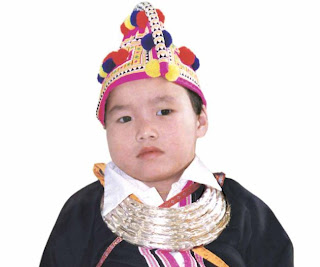Lia Lee 1982-2012
To say that Anne Fadiman's book The Spirit Catches You and You Fall Down was hugely influential on my life would be an understatement. It's pretty cliche for a doctor to say this about her book (akin to someone saying To Kill a Mockingbird is their favorite book, simply because they haven't read much since high school). I admit that I am not a particularly well read person, mostly because a busy life in medicine doesn't afford much down time for reading. However, for many of us in health care, the revelations in the book are profound and true.
Before my life as a doctor, I started out as an activist for homeless people. When deciding a career path, I realized the most important contribution I could make to help disenfranchised people at the margins of society was to become their physician. Before I was interested in anatomy, physiology, and biochemistry, I was interested in the stories people had to tell. How they got where they were, what their lives were like, and how they viewed their current plight. If you let people speak freely, they will eventually tell you what they need, even if they don't consciously realize what they need themselves. And often what they need is medicine. Often what they need is counseling. Often what they need is someone from within the system to hear them. I would be that person.
Flash forward about eight years.
I've been a good little med student, surrounded by old men in white coats, and classmates on their way to bright futures as subspecialists with German sports cars. My brain only thinks in terms of cranial nerves, generations of cephalosporins, and the DSM IV. I find myself an intern at the county hospital in Seattle. As it happens, this hospital is a pioneer in cross cultural medicine, with interpreters on staff for every language and culturally appropriate educational materials and seminars. The hospital is the primary source of medical care for refugees from all over the world, Latinos, Somalis, Ethiopians, Iraqis, Sudanese, Vietnamese. When a cargo container at the port is found to contain 30 emaciated Chinese immigrants, they come here to be cared for by a young, still somewhat idealistic, but obviously quite green intern. This intern is mystified why his patients don't understand they need to take their medicine every day or they will get sick and need to be hospitalized, or why a woman who watched her family get murdered in a war doesn't grasp that her unexplainable somatic symptoms are the result of PTSD.
It's about 1999, and in this crucible, a social worker gives the intern a copy of When The Spirit Catches You and You Fall Down. The book takes place in the California central valley in the early 90s where a community of Hmong refugees, escaping war and famine find themselves resettled. Lia Lee is a young woman born with a seizure disorder and is brought to a teaching hospital by her family. The drama in the story centers around the miscommunication between how Lee's family sees her illness and how the residents treat her. Lee's family believes that she's been touched by a healing spirit, and can be made well by appeals to other spirits, sacrifice, and atonement. The doctors who treat her become frustrated by her family's refusal to give medications or pursue radical treatments for what they see is a severe neurologic condition. As outlined, probably for the first time, by Fadiman, the Hmong mistrust many of western medicine's treatments, horrified by things like surgery and blood transfusions which may upset the individual's balance and wholeness, allowing evil spirits to enter their body. Lee's condition deteriorates, she loses the ability to speak, to walk. The Hmong further mistrust the doctors because their treatments, incorrectly applied by the family, aren't working. The doctors perceive abuse and neglect. Child protective services get involved. The story doesn't provide a happy resolution, except as a cautionary tale for others.
You can know everything there is to know about anti-epileptic drugs, antimicrobial mechanisms of resistance to antibiotics, or how to prevent surgical complications, but it means nothing at all if you don't listen to your patients.
In my career, this has not only been an important realization to make when I am trying to heal someone, it has been richly rewarding. In intimate settings, I have had the privilege to hear stories of pain, suffering, survival, and belief systems that run the entire gamut of the human experience. I hear it every day, and I am so honored to witness it. I realize that these truths that patients hold are usually no less true than those which medicine seeks to impose on them.
Shortly after being given this book, I found myself taking over in the ICU at the county hospital. There, I assume care of a relative young Hmong woman who has been in the hospital for weeks, dying of progressive liver failure for which no physician in the hospital has been able to diagnose or treat. All known infectious pathogens, autoimmune causes, or toxic agents have been ruled out. Each day, we replenish her fluids and electrolytes, adjust her feeding tube nutrition, but her condition is only deteriorating slowly while her husband and family never leave her side, in devoted emotional torture.
One morning, I am rounding and come to her room to find her surrounded by Buddhist monks in full regalia chanting prayers around her bed and it gives me chills. I've been up all night and am eager to go home but I decide not to interrupt them, holding back outside the room with the Hmong interpreter I have arranged to meet me every morning to update the family. She tells me a story that hit me in the gut and literally makes me find a private room to break down and sob.
20 years earlier, when this woman was 15 years old, she lived in a village, the daughter of a fairly prosperous farmer and local government official. It has been decided that she will marry the educated son of another family in the village. But one day she meets an older peasant from another, rival, village who makes her laugh and they fall in love. Against the family's wishes, and in secret, they flee the village together and get married. For their transgression, both the man and the woman are ostracized by their villages and before all contact with their families ceases, they are told that their love is cursed and will destroy them. With no place to go, they wander as refugees and when war hits, they eventually are evacuated, ending up in the United States. Still, they are happy together, they build a life and a business and have 6 beautiful children. But the price they have paid for their love weighs heavy over the years, knowing nothing of their home or their families.
"He thinks he has brought this upon his wife," the interpreter tells me, looking over at the husband.
Weeks later, after daily prayers, bedside vigils, even a pig sacrifice, and the best ICU level supportive care the American medical system has to offer, the woman dies of fulminant liver failure when the family decides, on the advice of the doctors, to withdraw care.
Many times I don't have answers or explanations for things that fit within a medical paradigm, but the world is richer when we understand people and their stories.
Lia Lee, the little girl born who served as the inspiration for The Spirit Catches You and You Fall Down, died two weeks ago on August 31, from complications of pneumonia, after living most of her life in a persistently vegetative state, for 30 years lovingly attended by her family. I have no idea if her outcome would have been better if the family had blindly followed doctor's orders, probably not. But I do know that she lived much longer and gave much more meaning to her family than most people in her condition. And her story has helped and inspired literally thousands of health care workers and probably hundreds of thousands of the families they care for.


Comments